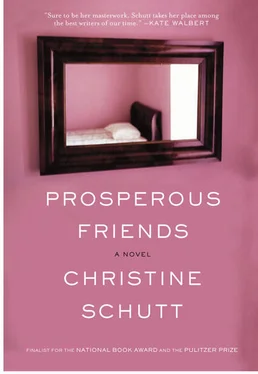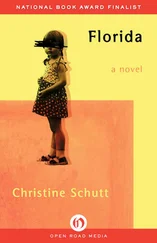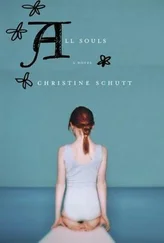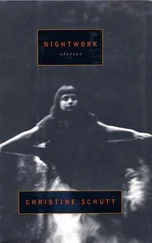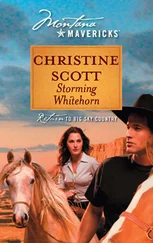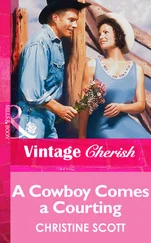Christine Schutt - Prosperous Friends
Здесь есть возможность читать онлайн «Christine Schutt - Prosperous Friends» весь текст электронной книги совершенно бесплатно (целиком полную версию без сокращений). В некоторых случаях можно слушать аудио, скачать через торрент в формате fb2 и присутствует краткое содержание. Год выпуска: 2012, Издательство: Grove Press, Жанр: Современная проза, на английском языке. Описание произведения, (предисловие) а так же отзывы посетителей доступны на портале библиотеки ЛибКат.
- Название:Prosperous Friends
- Автор:
- Издательство:Grove Press
- Жанр:
- Год:2012
- ISBN:нет данных
- Рейтинг книги:5 / 5. Голосов: 1
-
Избранное:Добавить в избранное
- Отзывы:
-
Ваша оценка:
- 100
- 1
- 2
- 3
- 4
- 5
Prosperous Friends: краткое содержание, описание и аннотация
Предлагаем к чтению аннотацию, описание, краткое содержание или предисловие (зависит от того, что написал сам автор книги «Prosperous Friends»). Если вы не нашли необходимую информацию о книге — напишите в комментариях, мы постараемся отыскать её.
Prosperous Friends
Prosperous Friends — читать онлайн бесплатно полную книгу (весь текст) целиком
Ниже представлен текст книги, разбитый по страницам. Система сохранения места последней прочитанной страницы, позволяет с удобством читать онлайн бесплатно книгу «Prosperous Friends», без необходимости каждый раз заново искать на чём Вы остановились. Поставьте закладку, и сможете в любой момент перейти на страницу, на которой закончили чтение.
Интервал:
Закладка:
Christine Schutt
A Day, a Night, Another Day, Summer: Stories
To Diane Williams
Prologue
Such exorbitant crying! Just when the old woman thought she had stopped crying, the girl would start again. The sound raised in the old woman gladness and amazement, and she lay awake to listen, but all she heard was crying; the rest she made up.
Infidelity? Boredom?
The old woman went downstairs to turn off the lights left on for the young couple now upstairs. She went close to the registry to see their names, but decided not to look.
What else did the old woman let herself know? Their car was like everyone’s car. New York plates. They were a couple; they had signed in under the same name. The girl’s name started with a large and upright I, but she was not wearing a ring and the boy stood apart as if he were single. They were traveling to East Blue Hill but for how long was a question they had answered differently. The girl said maybe six weeks; the boy said three.
The boy, the old woman thought, was very pretty. A girl would cry over losing him, but this much?
The girl’s kind of crying was at a pitch that befitted a graver occasion. The girl’s crying was wholehearted, a baby’s kind, in no way self-conscious; but unlike a baby’s crying, the girl’s had nothing to do with discomfort or hunger. Hers was purely announced sorrow.
The old woman had heard and so had the old man.
The old man, the next morning, looking at the ceiling, asked, “What was that last night?”
The old woman shook her head and said, “Wasn’t it terrible?”
“So she wasn’t moaning?”
“Honestly,” the old woman said, and she looked back at where he lay with his hands behind his head. This was crying, the sound of which made the old woman believe that she, the girl, was in the right. Whatever cause was being fought, the girl deserved to win for her sincerity. Her swept, stripped crying was like an empty room, the boxy shadows on the walls, the unfaded parts against which beds and desks had pressed. Whoever had lived there, slept there, adjusted in front of a mirror there, was dead.
The rooms left by the old woman’s dead are all yet unused. The closets are full; in a laundry basket still are her father’s best shoes in shoe trees, a box, tissue paper.
Spendthrift mourner.
Ten years come August. She should clear out Daddy’s room to add a room to the Wax Hill B & B.
Ed and Aura’s is a farmhouse laddered with additions and trellises of clematis and roses; the inside walls are thin; the floors, slant. The rooms the Kyles let are low-ceilinged in the way of farmhouses, but the best of these, with the morning light, Aura gave to this couple. Aura gave the couple the whitest room because of the girl but also because of the boy. Aura had looked at the two when they were reading the brochures Aura always gives to guests. Aura considered their faces — they were probably not so young, not a girl and a boy, though she was of an age that turned everyone under forty into girls and boys, and so, too, these guests. The girl’s straight eyebrows, her wide-open expression, the girl’s face and the boy’s face — she would not tire of looking at them.
No matter. The couple left the next morning. They left before breakfast, which Aura thought was wasteful.
Age is some of the story. Aura has a spot on her hand that she is watching grow. Halved in a fold of skin for a time, it has looked like shadow, but now the spot is larger and outstandingly itself; nevertheless, Aura believes only she knows the brown declivity for what it is.
Ed is eighty-two and proud of it.
Postdoc, London, 2002
The stone faces she saw on either side of the prior’s door looked surprised.
She always expected grotesque but not so Ned, no. Ned Bourne was walking into the world with his arms open, whereas she, she suspected, everything she knew about people came from looking at them through a window. Now there was Ned to take her to sacred places, to the Ship of the Fens, a cathedral in the marshes. They stood on the threshold of the prior’s door and felt how much cooler it was; the stones, cool and wet.
“Feel,” Ned said, and Isabel held out her hand and touched the wall, clammy as a toad’s but then think of all that had happened in this church!
“Come here,” Ned said. He was braced in a corner in shadow. “Here,” he said when she was closer. “Come here.”
“Someone will see,” she said even as she leaned against him and he rustled up her skirt. “Oh my, Ned!” Ned, skilled in astonishment as from the start. “Really,” she said, almost giving in to feeling but not quite — almost, nearly, a familiar breach in the intimate scene. She could only act excited, which he surely knew, and on the drive back to London, slashing past what they had passed before, the slurry view was all she saw: nothing still or edged but it was gone. Car turned in and paid for, day trip done.
“Let’s go home,” he said, and she looked up and saw he was far ahead. Why so fast, but Isabel Bourne caught up at the crosswalk and took hold of his hand and ran through the throbbing warning. A cold front or a damp front, in any case, a new front was coming in: The change for the worse in the weather chilled them. At home they drank soup and he sang aloud to her, “‘The grave’s a fine and private place.’”
Night’s disarray and rain and his disappointed face.
“What is it I can do for you, Isabel? What is it you need?” Ned asked.
If only she knew, but she never. .
“Never?”
“Don’t act as if this is news, Ned, please.”
He took her hand and led her to bed and the cold ordeal of readying for bed, which was readying for something else, and she was not ready. “Relax,” he said, and he worked to help her relax, stroked, kissed, used his hands inventively until after a while he rubbed himself against her mouth, her wet mouth moving, and the electric feather that was her tongue. He could, he could. “That’s good what you’re doing. Don’t stop.” And she didn’t and he was satisfied. “But what can I do for you?”
If only there were something she could think of.
Las Vegas, a summer ago, 2001, she was up for anything — no matter the small results: early-bird special, Tex-Mex, fried. Las Vegas looked like Candyland but the colorless sky was a desert, and it was hot, hot. She had never been to Nevada — never to Utah or Wyoming, a lot of states, really, so they had meandered, Isabel Stark then and the persuasively all-to-everyone Ned Bourne.
How was it she was here with him now in London, but she was, she was Isabel Bourne, changed and unchanged. Already she had seen so much with him: the orange canyons of Zion and Bryce, where they had looked up silenced by slabs of righteous nature. In the weathering weather of Wyoming a girl needed steams and cold cream every night. The mountains, yes, the Tetons, yes, spectacular, goes without saying, but flat stretches of fenced-off pale land made for bleak memories, not a tree or animal in sight, only carcasses twisted in barbed wire.
“Nothing?” Ned asked, swinging away from her in the bed, seated at its edge, waiting for an answer that was no more than a smile at the sight of his muscled legs. She reached out and petted him.
“Whatever you’re getting for yourself, get me some.”
On that road trip across the country, they had sussed out state specialties but what were the English specialties? Toad in the hole, Cornish pasty, shepherd’s pie, Ned had every intention of trying it all, bangers and mash, Stilton and port. In Minnesota they had discovered the pies were custardy, merangued, but what had been served up in South Dakota? Had they driven through at night? She remembered seeing buffalo. Buffalo in dirty coats slugging in the high grass — graceful, calm, as if eating were a kind of meditation.
Читать дальшеИнтервал:
Закладка:
Похожие книги на «Prosperous Friends»
Представляем Вашему вниманию похожие книги на «Prosperous Friends» списком для выбора. Мы отобрали схожую по названию и смыслу литературу в надежде предоставить читателям больше вариантов отыскать новые, интересные, ещё непрочитанные произведения.
Обсуждение, отзывы о книге «Prosperous Friends» и просто собственные мнения читателей. Оставьте ваши комментарии, напишите, что Вы думаете о произведении, его смысле или главных героях. Укажите что конкретно понравилось, а что нет, и почему Вы так считаете.
